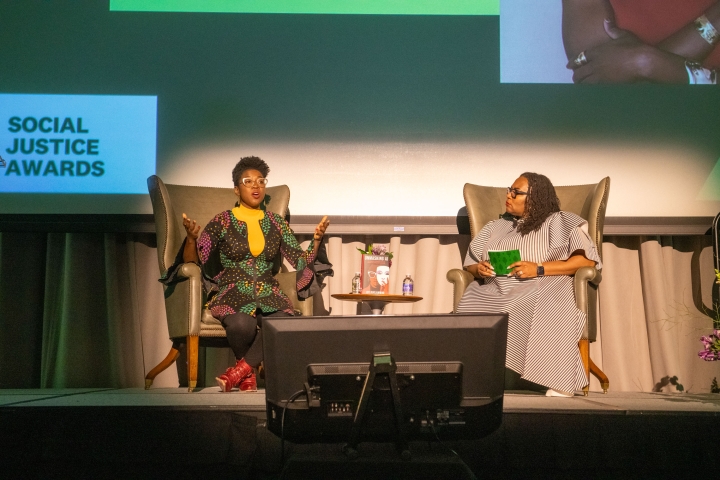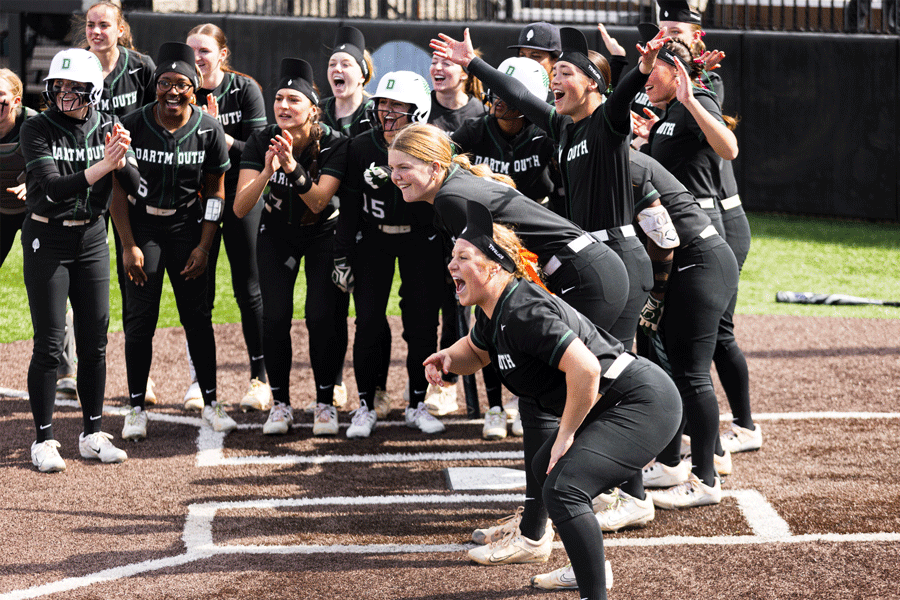The annual Social Justice Awards ceremony highlighted individuals and organizations for their commitment to civil rights, social and environmental justice, and health equity. More than 100 people gathered at the Hanover Inn on May 1 to honor the changemakers, with additional viewers tuning in via livestream.
“Every person can contribute to creating a more inclusive and just world through their individual spheres of influence,” says Shontay Delalue, senior vice president and senior diversity officer at Dartmouth.
Delalue’s statement was reflected in the keynote address by Dr. Joy Buolamwini, who combines her talent and passion for art with a dedication to championing algorithmic justice to promote more equitable AI practices. Buolamwini is a distinguished researcher, artist, model, and bestselling author of Unmasking AI. The founder of the nonprofit Algorithmic Justice League, and known as the “Poet of Code,” she blends research and art to shed light on AI’s societal impacts.
Buolamwini and Delalue, spoke in a fireside chat after the keynote.
“AI is based on data and a reflection of history…and for some groups, those histories are painful,” Delalue said during a fireside chat with Buolamwini. “What role can AI play in terms of addressing social ills?”
Buolamwini addressed the urgent need for transparency and accountability in AI development, stressing the importance of continuous inspection and ethical practices.
“Algorithmic hygiene” requires ongoing scrutiny and proactive measures to rectify biases and ensure equitable outcomes, she said. “We really need to think about it not like an immediate infection, but chronic illness. So, this is something that has to be managed over time.”

Buolamwini also underscored the transformative power of storytelling and creative expression in raising awareness and fostering dialogue around algorithmic injustices.
“The narrative stays in our minds,” she said, highlighting the role of art in challenging entrenched biases and amplifying marginalized voices. “I cannot stress how important the act of storytelling continues to be, because ultimately the heart of computing is humanity.”
Buolamwini, who described her journey from enthusiastic PhD student at the Massachusetts Institute of Technology to becoming a leading voice for algorithmic justice, encouraged aspiring technologists, activists, and changemakers to “never stop dreaming” and to persist in their pursuit of justice and equity.
“It’s so easy to be discouraged when we look at the state of the world, to think that your highest aspirations are worth working towards. But they truly are,” said Buolamwini. “I’m able to live my dreams now because I took the chance and I took the risk to focus on topics that I cared about regardless of their popularity.”
“We can learn from the past…but if we don’t, what I fear is the technologies of the future actually reverse the progress we have made towards civil rights and inclusion progress,” said Buolamwini. “That’s the reason for the Algorithmic Justice League. To say we can and must do better.”
The 2024 awardees “have dedicated their time, talent, and energy to create a more just and equitable world,” said Chloe Poston, vice president for culture, belonging, and strategic engagement, who introduced the awards presentation. “I am excited to have this moment to recognize them.”
The presentation included a video montage of interviews with the winners.
Emerging Leadership Award
Zantasia Johnson, assistant director, Office of Pluralism and Leadership, was honored for her contributions, including her assistance to Black and Pan African student advising. Johnson’s leadership roles within the Black Caucus and the Empowering Women of Color employee resource networks, alongside her active participation in committees focused on promoting change and community, including the Dartmouth Intergenerational Mentorship Experience program and the Dialogue Project, exemplify the support she has extended to students, faculty, and staff during the three years she has been at Dartmouth.
Ongoing Commitment Awards
Members of the Class of 1974 Health Equity Working Group—Bill Geiger, Mike Thomas, Jerry Bowe, Peter Haffenreffer, Rick Ranger, Matt Putnam, Morris “Rocky” Whitaker, Bill White, and Phil Stebbins, all ’74s—were honored for their work identifying, addressing, and increasing education on racial disparities in public health. For their 50th reunion, the group has a goal of raising $500,000 for a health equity fund, helping to contribute to research and a future where race doesn’t dictate health outcomes.
Kristin Powell ’10, deputy director at Black Futures Lab, was recognized for her efforts to increase the political power of the Black community through Black Futures Lab, including spearheading the largest-ever Black census poll, which will be used to identify priority issues and shape public policies that advance social justice.
Holly Fell Sateia Awards
Director of Bands Brian Messier, who is also senior liaison for Hopkins Center ensembles, was honored for his work with the Mexican Repertoire Initiative and its mission and efforts to increase awareness of the ongoing racism, inequality, and underrepresentation of Latinx communities in the wind band world.
Alan Chow, catering staff member at the Hanover Inn, was recognized for his commitment, genuine engagement, and dedication to Dartmouth, the Hanover Inn, its banquets team, and the colleagues, students, staff, and faculty he has encountered through the years.
Lifetime Achievement Award
Professor of Business Administration Ella Bell Smith was recognized for her contributions over two decades. She is a founding faculty director of the Tuck Initiative on Workplace Inclusion, and a social justice leader—challenging students, colleagues, and corporations on their notions of race, gender, and class.

Student Organization Award
The Fuerza Farmworkers’ Fund was honored for its work aiding migrant laborers within the Upper Valley, offering support in health care accessibility and language proficiency development, and alleviating financial barriers.
Lester B. Granger ’18 Award
Daniel Lucey ’77, MED ’82, a clinical professor of medicine and adjunct professor of health policy and clinical practice, received the award for his work and dedication as an international infectious disease specialist, focusing on the intersection of infectious diseases and historically marginalized populations. Lucey advocates for governments and international organizations to implement more proactive and heightened measures in order to enhance their readiness in the face of global health epidemics.
The event was co-sponsored by Institutional Diversity and Equity, the William Jewett Tucker Center, the Dartmouth Center for Social Impact, the Martin Luther King Jr. Celebration Committee, and Geisel School of Medicine.
View the video of the ceremony.


